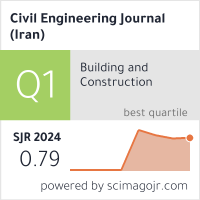Index-based Approach to Evaluate City Resilience in Flooding Scenarios
Downloads
Intense rainfall events combined with high tide levels frequently result in urban floods in riverine or coastal cities. Their increasing variability and uncertainty demand urgent but sustained responses. Thus, resilience-driven approaches are emerging in contrast to the traditional technical-economic frameworks, as urban resilience reflects the overall capacity of a city to survive, adapt and thrive when experiencing stresses and shocks. This paper presents a simplified index-based methodology for the evaluation and quantification of urban resilience to flooding, based on the works developed in the EU H2020 RESCCUE project. A set of five indicators are proposed to compute the Integrated Urban Resilience Index (IURI), allowing to classify resilience according to a proposed range of rankings. This methodology considers simultaneously a multisectoral approach, reflecting services interdependences, and a sectorial approach, applying 1D/2D computational modelling of the urban drainage network. It was applied to the study case of Lisbon downtown, involving the analysis of interdependencies between 124 infrastructures of 10 urban services. Two scenarios were considered, respecting the current and future situations, considering climate changes. Results enhance the usefulness, practicability, and potential of the proposed approach, and improvement opportunities were also identified for future developments.
Doi:10.28991/cej-2021-03091647
Full Text:PDF
Downloads
[2] Guerrero-Hidalga, María, Eduardo Martínez-Gomariz, Barry Evans, James Webber, Montserrat Termes-Rifé, Beniamino Russo, and Luca Locatelli. "Methodology to Prioritize Climate Adaptation Measures in Urban Areas. Barcelona and Bristol Case Studies.” Sustainability 12, no. 12 (June 12, 2020): 4807. doi:10.3390/su12124807.
[3] Christopher B. et al., ‘2014: Technical summary', Cambridge University Press, Cambridge, United Kingdom and New York, NY, USA, (2014).
[4] ONU, Ed., ‘Transforming Our World: The 2030 Agenda for Sustainable Development'. 2015. Available online: https://sustainabledevelopment.un.org/content/documents/21252030%20Agenda%20for%20Sustainable%20Development%20web.pdf (accessed on August 2020).
[5] Cardoso, M. A., R. S. Brito, and M. C. Almeida. "Approach to Develop a Climate Change Resilience Assessment Framework.” H2Open Journal 3, no. 1 (January 1, 2020): 77–88. doi:10.2166/h2oj.2020.003.
[6] M. Henderson, L. Tirone, and B. Smith, ‘Resilient Lisbon Workshop Report', AECOM, Lisbon, Portugal, (2016).
[7] Cardoso, Maria Adriana, Rita Salgado Brito, Cristina Pereira, Andoni Gonzalez, John Stevens, and Maria Joí£o Telhado. "RAF Resilience Assessment Framework”A Tool to Support Cities' Action Planning.” Sustainability 12, no. 6 (March 17, 2020): 2349. doi:10.3390/su12062349.
[8] Blanco-Londoño, Sergio Andrés, Patricia Torres-Lozada, and Alberto Galvis-Castaño. "Identification of Resilience Factors, Variables and Indicators for Sustainable Management of Urban Drainage Systems.” DYNA 84, no. 203 (October 1, 2017): 126–133. doi:10.15446/dyna.v84n203.58116.
[9] A. Matzinger, M. Zamzow, M. Riechel, and P. Rouault, ‘Resilience of urban drainage systems - Proposition of a quantitative approach', in Urban Water, Planning and technologies for sustainable management, Lyon, France, (2019): 4.
[10] Rezende, Osvaldo M., Francis M. Miranda, Assed N. Haddad, and Marcelo G. Miguez. "A Framework to Evaluate Urban Flood Resilience of Design Alternatives for Flood Defence Considering Future Adverse Scenarios.” Water 11, no. 7 (July 17, 2019): 1485. doi:10.3390/w11071485.
[11] Almeida, Maria do Céu, Maria Joí£o Telhado, Marco Morais, Joí£o Barreiro, and Ruth Lopes. "Urban Resilience to Flooding: Triangulation of Methods for Hazard Identification in Urban Areas.” Sustainability 12, no. 6 (March 12, 2020): 2227. doi:10.3390/su12062227.
[12] Diao, Kegong. "Multiscale Resilience in Water Distribution and Drainage Systems.” Water 12, no. 6 (May 27, 2020): 1521. doi:10.3390/w12061521.
[13] Dong, Xin, Hao Guo, and Siyu Zeng. "Enhancing Future Resilience in Urban Drainage System: Green versus Grey Infrastructure.” Water Research 124 (November 2017): 280–289. doi:10.1016/j.watres.2017.07.038.
[14] CETAQUA, ‘RESCCUE - Resiliene to Cope with Climate Change in Urban Areas', RESCCUE PROJECT. Available online: http://www.resccue.eu/resccue-project (accessed on July 2020).
[15] US EPA, ‘Storm Water Management Model (SWMM)', Apr. 30, 2019. Available online: https://www.epa.gov/water-research/storm-water-management-model-swmm (accessed on May 2020).
[16] BASEMENT - Basic Simulation Environemnt for Computation of Environmental Flow and Natural Hazard Simulation. ETH Zurich - VAW, (2006).
[17] J. Barreiro, ‘Contribuiçí£o para a Avaliaçí£o de Resiliíªncia Urbana a Eventos Extremos de Precipitaçí£o: O Caso das Bacias da Avenida da Liberdade e Almirante Reis, em Lisboa', Dissertation to obtain the Master in Science degree in Environmental Engineering, Instituto Superior Técnico of Lisbon University, Lisboa, (2017).
[18] HIDRA, ENGIDRO, and Bluefocus, ‘Plano Geral de Drenagem de Lisboa 2016-2030', Cí¢mara Municipal de Lisboa, (2016).
[19] P. E. Oliveira, ‘Inundaçíµes na cidade de Lisboa: implicaçíµes da melhoria do sistema de drenagem artifical após os anos 60', presented at the X Colóquio Ibérico de Geografia, í‰vora, Portugal, Sep. (2005).
[20] Instituto Nacional de Estatística., Censos 2011 Resultados definitivos - Regií£o Lisboa. Lisbon, Portugal: Instituto Nacional de Estatística, (2012).
[21] Cláudia Brandí£o, Rui Rodrigues, and Joaquim Pinto da Costa, ‘Análise de Fenómenos Extremos: Precipitaçíµes Intensas em Portugal Continental', Direçí£o dos Serviços de Recursos Hídricos, Lisboa, Dec. (2001).
[22] C. Antunes, C. Catita, and C. Rocha, ‘Estudo de Avaliaçí£o da Sobrelevaçí£o da Maré - Determinaçí£o da Cartografia de Inundaçí£o e Vulnerabilidade da írea Ribeirinha de Lisboa afetada pela Sobrelevaçí£o da Maré como consequíªncia da futura subida do Nível Médio do Mar', Faculdade de Ciíªncidas da Universidade de Lisboa, Lisbon, Portugal, (2017).
[23] R. Monjo et al., ‘Report on extreme events prediction', RESCCUE Project Deliverable 1.3. (Public), Barcelona, Spain, (2019).
- Authors retain all copyrights. It is noticeable that authors will not be forced to sign any copyright transfer agreements.
- This work (including HTML and PDF Files) is licensed under a Creative Commons Attribution 4.0 International License.![]()















